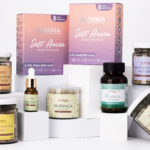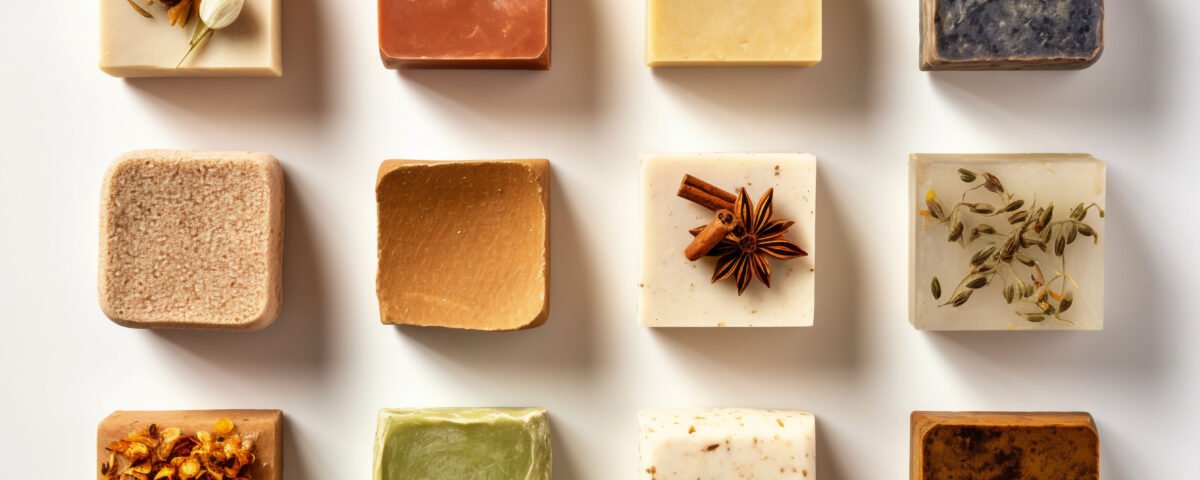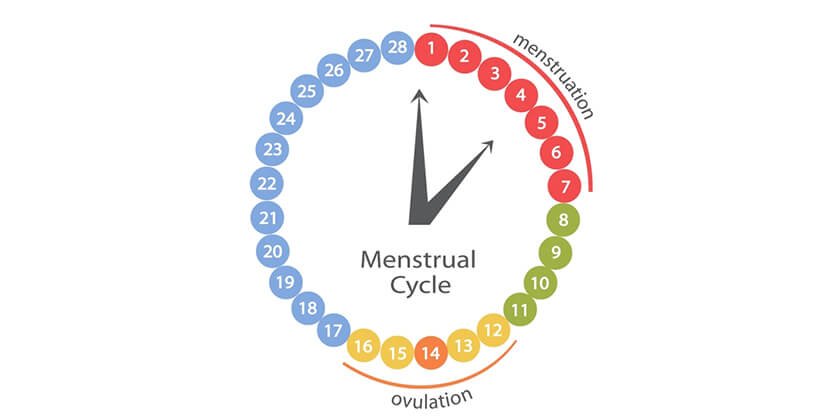
Anion Pads and Menstrual Health in Teenagers: A Parent’s Guide
September 19, 2024
Top 5 Women’s Wellness products to include in your daily routine
September 28, 2024When it comes to skincare, the debate between handmade and commercial soaps has been a hot topic for years. For many, soap is just soap—a simple tool to cleanse the body. But when you dig deeper, the differences between handmade and commercial soaps become evident. Handmade soaps, like those crafted by Aurora, offer a level of care, quality, and artistry that mass-produced commercial soaps often can’t match.
If you’ve ever wondered what makes handmade soaps special, or why they’re worth investing in, you’re not alone. In this blog, we’ll explore the key differences between handmade soaps and their commercial counterparts, and why choosing handmade can make all the difference for your skin and overall wellness.
1. Ingredients: Quality over quantity
One of the most striking differences between handmade and commercial soaps lies in the ingredients. Handmade soaps are often made with high-quality, natural ingredients like plant-based oils, butter, essential oils, and herbs. These ingredients are chosen for their ability to nourish, cleanse, and moisturize the skin without stripping away its natural oils.
For instance, Aurora’s Anti Acne Soap uses a blend of neem, basil, and nettle leaf, ingredients known for their antibacterial and anti-inflammatory properties. This makes it perfect for acne-prone skin, offering a gentle yet effective solution without harsh chemicals.
On the other hand, commercial soaps are typically made with synthetic detergents, preservatives, and artificial fragrances. These ingredients can strip the skin of its natural moisture, leaving it feeling dry and tight after washing. While these soaps may foam and cleanse effectively, the ingredients used are often designed for mass production and longer shelf life, not for the benefit of your skin.
Why ingredients matter?
Natural oils: Handmade soaps use oils like coconut, olive, or shea butter that nourish and moisturize the skin.
Absence of harsh chemicals: Commercial soaps often include sulfates, parabens, and artificial fragrances that can irritate sensitive skin.
Custom blends: Handmade soaps allow for creative blends of herbs and oils tailored to specific skin needs, such as acne, dryness, or sensitive skin.
2. The glycerin factor: Hydration at its best
One of the hidden gems in handmade soap is glycerin. Glycerin is a natural byproduct of the soap-making process and is known for its humectant properties—it draws moisture from the air to the skin, keeping it hydrated.
In commercial soap production, glycerin is often removed to be used in more lucrative products like lotions and moisturizers. This leaves commercial soaps much harsher on the skin. In contrast, handmade soaps retain all their natural glycerin, which helps the skin stay soft and moisturized after each wash.
For instance, Aurora’s Butter Cube Soap is packed with moisturizing butters like shea, mango, and cocoa butter. When combined with the glycerin naturally produced during the soap-making process, this soap provides deep hydration, leaving your skin feeling smooth and supple without needing additional moisturizers.
Why glycerin is important?
Moisturizing properties: Glycerin helps keep your skin hydrated by attracting moisture from the environment.
Gentle on skin: Retaining glycerin in handmade soaps makes them ideal for people with dry or sensitive skin.
Prevents stripping: Commercial soaps often leave the skin dry due to the lack of glycerin, requiring additional moisturizing products.
3. Process: Handcrafted with care vs. Mass production
The process of making handmade soap is an art. At Aurora, each soap is crafted using the cold process method, a time-honored technique that allows for a slow, gentle saponification process. This method not only preserves the integrity of the natural ingredients but also creates a luxurious, creamy lather that is gentle on the skin.
In contrast, commercial soaps are mass-produced using hot process methods that prioritize speed and efficiency over quality. The soaps are often made in large batches with artificial chemicals to speed up the curing process. While this allows for faster production and longer shelf life, it often compromises the quality and benefits of the final product.
Handmade soaps, like Aurora’s Manjistha Soap, go through a curing period that allows the soap to harden naturally while preserving the nutrients and beneficial properties of the ingredients. This soap, which includes the Ayurvedic herb Manjistha, is designed to brighten the complexion and detoxify the skin, offering a more holistic skincare experience.
Why process matters?
Cold process: Handmade soaps are crafted slowly, preserving the natural benefits of oils and herbs.
No shortcuts: Commercial soaps use quick manufacturing techniques that prioritize shelf life over skincare benefits.
Artistry: Each handmade soap bar is unique, carefully crafted to maintain the highest quality.
4. Customization and personalization
One of the most appealing aspects of handmade soap is the personalization. Handmade soaps are often created in small batches, allowing for a level of customization that you simply won’t find in commercial soap brands. Whether you’re looking for a soap that addresses specific skin concerns, like Aurora’s Anti Acne Soap, or one that offers a sensory experience through aromatherapy, the options are endless.
Handmade soap makers have the freedom to experiment with different essential oils, clays, herbs, and butters, creating blends that cater to various skin types and needs. Commercial soaps, by contrast, are mass-produced with a one-size-fits-all mentality. While they may offer a few different scents or varieties, they lack the uniqueness and individuality that handmade soaps provide
Benefits of customization:
Tailored to your needs: Handmade soaps can address specific skin issues like acne, dryness, or sensitivity.
Aromatherapy benefits: Essential oils in handmade soaps offer more than just scent—they can help with relaxation, mood enhancement, and stress relief.
Variety: With handmade soaps, you can enjoy an ever-evolving variety of scents and formulations, keeping your skincare routine exciting.
5. Environmental impact: Handmade soaps are kinder to the planet
When it comes to sustainability, handmade soaps are typically much more eco-friendly than their commercial counterparts. Most handmade soap makers, including Aurora, prioritize using natural, biodegradable ingredients that are gentle on both your skin and the environment. The packaging is often minimal and plastic-free, further reducing the environmental impact.
Commercial soaps, on the other hand, often come packaged in plastic, and the chemicals used in their production can be harmful to aquatic life when washed down the drain. Furthermore, the mass production process consumes a lot of energy, adding to their environmental footprint.
At Aurora, we aim to create products that are not only good for your skin but also respectful of the planet. Our soaps are crafted with sustainability in mind, using biodegradable ingredients and eco-friendly packaging.
Environmental benefits of handmade soaps:
Biodegradable ingredients: Handmade soaps use natural ingredients that break down easily in the environment.
Less packaging: Handmade soaps are often minimally packaged, reducing plastic waste.
Eco-conscious production: Small-batch production is more sustainable and energy-efficient than mass production..
6. Transparency and trust
When you buy handmade soap, you know exactly what you’re getting. At Aurora, we are transparent about the ingredients we use, from the natural oils to the essential herbs in our soaps. There are no hidden chemicals, fillers, or synthetic additives—just pure, natural goodness.
With commercial soaps, you often don’t know the full extent of what’s in the product. The ingredient lists can be long, confusing, and filled with synthetic substances that can be harmful to your skin in the long run. By choosing handmade soaps, you’re investing in products you can trust, made with integrity and care.
Why transparency matters?
No hidden chemicals: Handmade soaps offer clear ingredient lists, so you know exactly what you're putting on your skin.
Trust in quality: Handmade soaps are crafted with care and a focus on the well-being of your skin.
Ethical production: Small-scale soap makers often prioritize ethical sourcing of ingredients, creating products you can feel good about.
Why handmade soaps are worth the investment?
Choosing between handmade and commercial soap is more than just a skincare decision—it’s a choice that impacts your health, the environment, and your overall well-being. Handmade soaps, like the ones offered by Aurora, stand out for their high-quality ingredients, natural glycerin retention, artisanal production processes, and commitment to sustainability.
While commercial soaps may offer convenience and a lower price point, they often come at the cost of skin health and environmental sustainability. Handmade soaps, on the other hand, provide a luxurious, nourishing experience that your skin will thank you for. Whether you’re using the Anti Acne Soap for clearer skin, the Manjistha Soap for a brighter complexion, or the Butter Cube Soap for intense hydration, you can trust that you’re using a product designed with care and integrity.
When it comes to skincare, your body deserves the best. Make the switch to handmade soap, and experience the difference it makes for both your skin and the planet.




